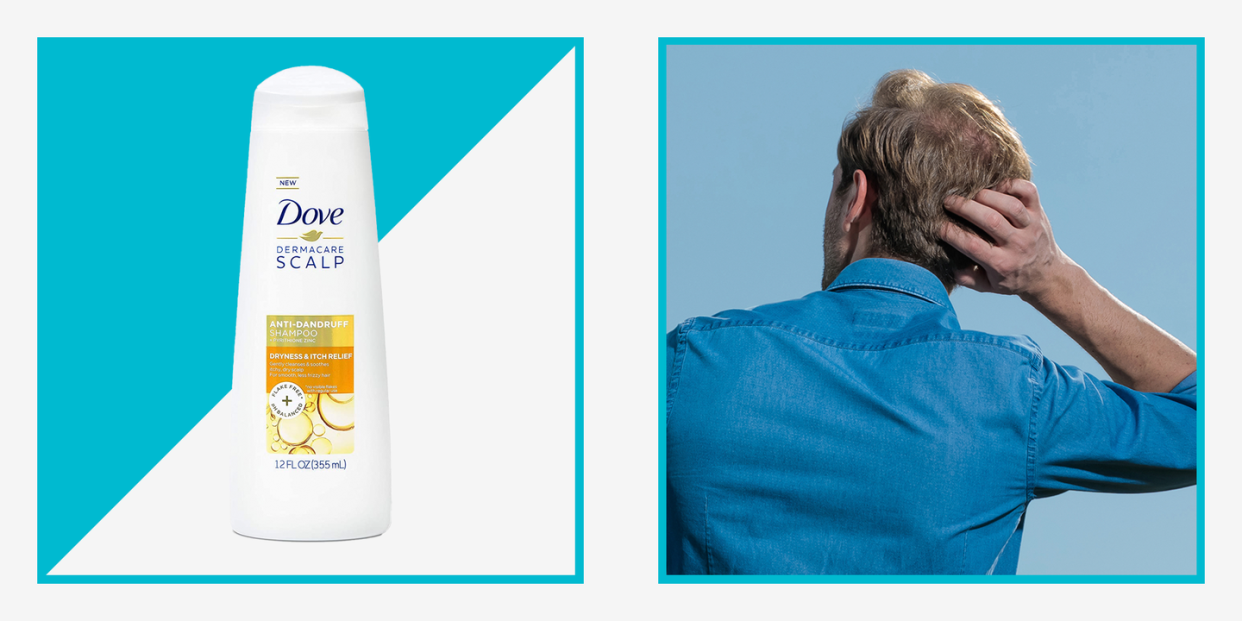How to Treat an Itchy Scalp, According to a Dermatologist

When you have an itchy scalp, it can be difficult to think about anything else. Scratching offers some relief, but never enough. If you're not scratching, you're worried about the dry skin flakes potentially coming off your scalp. Talk about embarrassing. To stop the scratch, you need to find out what’s causing it.
Getting to the root cause of an itchy scalp is a real head-scratcher, pun intended. Dandruff is one of the most common reasons why you can't stop scratching, but many conditions can cause the same symptoms. To get to the bottom of what causes an itchy scalp and how to treat it, we asked Dr. Saurabh Singh, Cosmetic Dermatologist and Co Founder of SkinTap, to weigh in.
What Causes an Itchy Scalp?
Scalp itchiness can be a symptom of a few common scalp disorders and underlying skin conditions, Dr. Singh explains.
"The most common condition is seborrheic dermatitis, which is also called dandruff in its mildest form," he says. "Most dermatologists believe that seborrheic dermatitis is caused by an abnormal inflammatory reaction to a commensal yeast that is found on the scalp. What triggers that aberrant immune response is unclear."
An itchy, dry, and flaky scalp could be a sign of an allergic reaction to an ingredient in your hair products, which doctors refer to as contact dermatitis. Excessive build up of hair products can also lead to an itchy, flakey scalp. If you start to notice red, scaly patches around the forehead, the back of your neck or even in your ears, it may be a sign of scalp psoriasis. Ringworm, head lice, scabies, and hives can also occur on the scalp and cause dry, itchy skin.
Whether you have dandruff, contact dermatitis, scalp psoriasis, another skin condition, a medical professional is the best person to assess and diagnose your symptoms and help you find relief.
Read more: Everything You Need to Know About Dandruff
How to Treat an Itchy Scalp Fast
Resist the urge to scratch
We know it can be hard to resist, but there's no scratching your way to relief when it comes to an itchy scalp. Excessive scratching will only make it worse, and potentially introduce new bacteria into the red, sensitive skin. A cold ice pack can provide some temporary relief while you seek out a more permanent solution.
Apply an OTC treatment
If you're suffering with dandruff, the most common cause of an itchy scalp, an OTC treatment is the fastest way to banish flakes for good.
"The most common OTC treatments are shampoos that contain one or more of the following active ingredients: ketoconazole, selenium sulfide, pyrithione zinc, coal tar, hydrocortisone, sulfur and salicylic acid," says Dr. Singh. "Many of the prescription products are stronger versions of the aforementioned medications."
Nizoral is the only over the counter dandruff shampoo with ketoconazole, a clinically proven dandruff fighting ingredient. It starts working from the first use, so relief is nearly immediate. If dandruff is a common occurrence, use it twice per week between regular shampoos to keep it in check.
Read more: Anti-Dandruff Shampoos
If over-the-counter anti-dandruff shampoos don't work for you, your doctor may prescribe you a prescription-strength shampoo. They can also prescribe a steroid lotion to treat the symptoms associated with a dry, flaky scalp.
Use gentle shampoos and hair products
Nizoral is an effective treatment for dandruff, but if you're someone who regularly experiences an itchy scalp, it may be wise to investigate the rest of your hair care routine and see if any of the products you're using are exacerbating the condition or causing irritation. Shampoos with fragrances and dyes may be causing the problem, so make sure to investigate your products for common irritants and consider upgrading to gentle, sulfate-free formulas that are designed to calm irritation and are hydrating for the scalp.
Read more: Best Shampoos for Men
Use scalp-focused hair products
Anti-dandruff treatment and gentle shampoos can be effective at fighting dandruff and dry scalp, but there are many targeted treatments you can try as well. While you can't go wrong with the classic Head & Shoulders, there are tons of new hair care brands that specialize in scalp care making targeted treatments with your scalp in mind. These products can help calm scalp irritation, remove buildup, balance sebum levels, and treat conditions such as dandruff and psoriasis.
Read more: Best Hair Products for Men
Try an at-home natural remedy
While OTC treatments are certainly effective at treating an itchy scalp, there's some evidence to support natural remedies as a solution to dandruff. As Dr. Singh explained, dandruff is cause by an increase in yeast on the scalp. Tea tee oil, apple cider vinegar, baking soda, and coconut oil have all been shown to have anti-fungal properties, which kills the dandruff-causing yeast. Many of these topical treatments are also anti-bacterial, which can help remove excess oil on the scalp.
A word of warning: many of these natural remedies can cause irritation when used in their pure form and must be diluted with water or oil prior to application. If you experience any discomfort from any of these treatments, wash it out immediately and make an appointment with a qualified medical professional. Natural remedies are also not an equal replacement for a doctor's advice or OTC treatments. While some early studies have shown promising results, more research is necessary to determine just how effective some of these methods truly are.
See a dermatologist
You might assume the cause of your itchy scalp is dandruff, but you can't be sure without a professional's opinion. If the problem persists, see a dermatologist to help properly diagnose your scalp issue and suggest a treatment plan. For quick, effective relief, reaching out to your dermatologist is your best bet.
You Might Also Like

